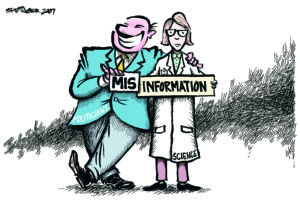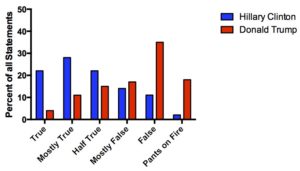
With two months to go before election day, we’ve already seen numerous candidates in numerous debates. It seems like politicians will debate everything…except science. Science is all around us, and has wide reaching economic, health, and social implications. Despite this, science is conspicuously absent in the current political discourse. With science affecting so many aspects of our lives, it is imperative that politicians discuss how science will shape their decisions and policies.
Some would argue that politicians should not talk about science because they are not scientists. They readily discuss economic issues, but are not economists, so what makes science different? Many organizations are calling on our presidential candidates to have a debate about scientific issues where candidates could discuss how their views on issues related to science will affect their policy. For instance, will they implement laws affecting companies contributing to global warming, or will they create regulations on genetically modified foods? One such organization, ScienceDebate.org, is a nonpartisan organization promoting the importance of science in the national dialog. They are currently crowdsourcing questions for political candidates to answer during a live debate about science issues. Their effort, backed by Nobel laureates, scientific leaders, presidents, and celebrities, encourages everyone to get involved in starting this dialog, and challenges politicians to be clear on their stances regarding science related issues. In 2008 and 2012, ScienceDebate.org posed 14 questions relating to science issues written in by citizens to the canditates (Obama and McCain then Obama and Romney) and received answers, which they then posted in side-by-side comparisons. It revealed the candidate’s views on specific scientific issues such as stem cell research, genetics research, and scientific integrity, which may have otherwise never come up during a political debate. (If you want to get involved, sign the petition calling for a 2016 science debate of the presidential candidates, or submit a question about science issues important to you.)
Although politicians are being encouraged to talk about their views on science, how much of what they say can we believe? Organizations like PolitiFact are doing their part by fact checking politicians’ statements to ensure that the public is receiving accurate information.

So how are they doing? After PolitiFact checks the accuracy of statements made, they categorize them into one of 6 grades ranging from True to Pants on Fire. PolitiFact releases what they call “report cards” showing of all the statements they have checked for accuracy, and how those statements are graded. Hillary Clinton has most statements falling into the Mostly True category (just one step below True), while Donald Trump has the most statements falling into the False category.
So with pressure to make accurate — well, mostly accurate — statements, and growing pressure to discuss science related topics, what will we be seeing from the candidates? Hopefully, we’ll hear what the presidential candidates have to say about everything from genetically modified food, to space programs, to vaccines. However, there is just one issue that the candidates have been asked to discuss so far; climate change. While Hillary Clinton has clear plans for the imminent threat of climate change, Donald Trump denies climate change is happening until someone can “prove it to him”. So despite overwhelming scientific evidence that climate change is real and a serious issue, politicians’ views are wide ranging, from serious threat to pseudo-scientific theory. These views will shape how they make choices about policy. Science matters, it is real, let’s talk about it.
Peer edited by Tamara Vital
Follow us on social media and never miss an article:
Update: Presidential candidates respond to questions about top science issues posed by http://sciencedebate.org. http://sciencedebate.org/20answers